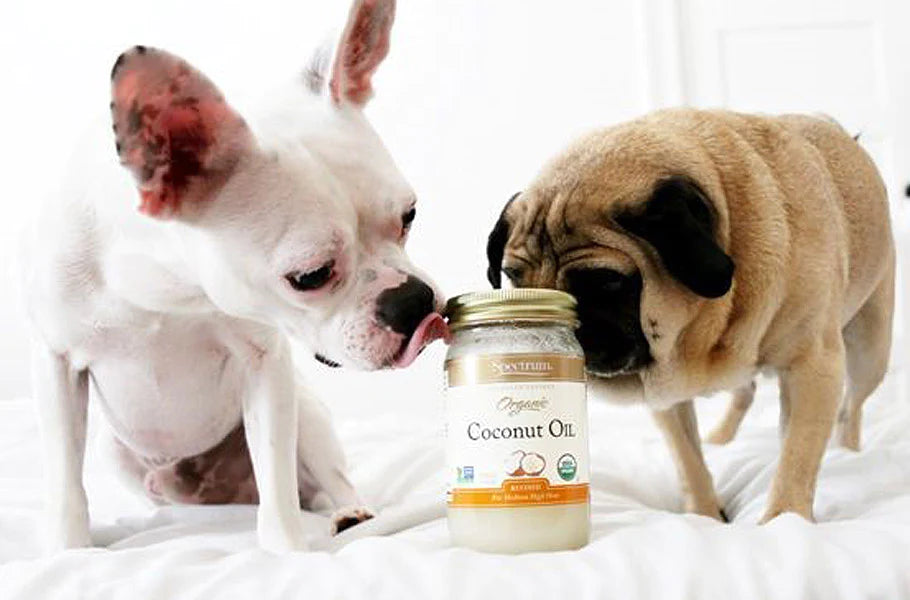Ever wondered if that jar of coconut oil sitting in your kitchen could be a secret weapon for your furry friend's health? Well, wonder no more! Coconut oil isn't just a kitchen staple; it's also a fantastic addition to your dog's wellness routine. Packed with all sorts of goodness, coconut oil offers many benefits for our doggos. From promoting shiny coats to boosting digestion, this natural wonder has a whole lot to offer.
Health Benefits of Coconut Oil for Dogs

Improving coat and skin health:
Coconut oil can be used for your pet's coat and skin. Its moisturizing properties can help soothe dry, itchy skin and reduce irritation. Regular use of the oil can lead to a shinier, healthier-looking coat for your pup. Simply apply a small amount of oil to your dog's skin or fur and gently massage it in for best results.
Boosting digestion and nutrient absorption:
Coconut oil is also great for your dog's digestive health. The medium-chain fatty acids found in this oil can help improve digestion and nutrient absorption, leading to better overall health for your dog. Adding a small amount of oil to your dog's food can help promote healthy digestion and make sure they're getting the most out of their meals.
Supporting immune function:
Believe it or not, coconut oil can also help boost your dog's immune system. Its antibacterial, antiviral, and antifungal properties can help protect against infections and keep your pup healthy and happy. Regularly incorporating coconut oil into your dog's diet can help support their immune function and keep them feeling their best year-round.
Providing relief for joint pain and arthritis:
If your dog suffers from joint pain or arthritis, coconut oil may offer some relief. The anti-inflammatory properties of coconut oil can help reduce inflammation and ease discomfort in achy joints. Simply add a small amount of oil to your dog's food each day to help alleviate their pain and improve their mobility.
Using Coconut Oil for External Applications

Moisturizing dry skin and paw pads:
Simply apply a small amount of coconut oil to the affected areas and gently massage it in. The oil will help hydrate and nourish your dog's skin, leaving it feeling soft and supple. Regular use of coconut oil can help prevent dryness and cracking, keeping your pup's skin and paw pads healthy and moisturized.
Treating minor cuts, wounds, and hot spots:
Coconut oil has antibacterial and antifungal properties that make it an excellent treatment for minor cuts, wounds, and hot spots on your dog's skin. Clean the affected area with mild soap and water, then apply a thin layer of coconut oil to help promote healing and prevent infection. The oil will create a protective barrier over the wound, allowing it to heal more quickly and reducing the risk of further irritation or infection.
Applying as a natural flea repellent:
That's right! Coconut oil can also help repel fleas and ticks from your dog's coat. The strong scent of coconut oil is unpleasant to pests, making it an effective natural repellent. Rub a small amount of oil into your dog's fur, paying special attention to areas where fleas and ticks are most likely to hide, such as around the neck and ears. Regular application of coconut oil can help keep pesky pests at bay and protect your pup from flea and tick infestations.
Using for ear cleaning and treatment:
This oil can also be used to clean and treat your dog's ears. Its antibacterial and antifungal properties make it an excellent solution for removing dirt, wax, and debris from your dog's ears and preventing ear infections. Apply a small amount of coconut oil to a cotton ball or soft cloth and gently wipe the inside of your dog's ears. Be sure to avoid inserting anything into your dog's ear canal, as this can cause injury or discomfort. Regular ear cleaning with coconut oil can help keep your dog's ears clean and healthy, reducing the risk of ear infections and other ear-related issues.
Incorporating Coconut Oil into Your Dog's Diet

Adding to food as a dietary supplement:
Just mix a small amount of coconut oil into your dog's food each day to provide them with an extra boost of nutrients. Coconut oil contains beneficial fatty acids that can support your dog's overall health, including their immune system and digestion. Start with a small amount, such as a teaspoon for small dogs or a tablespoon for larger breeds, and gradually increase the dosage as needed. Be mindful not to exceed the recommended dosage to avoid digestive upset.
Using for homemade dog treats and recipes:
Another great way to use coconut oil for your dog is by adding it into homemade dog treats and recipes. Coconut oil can be used as a healthy and delicious ingredient in many homemade dog treats, including biscuits, frozen treats, and pupcakes. Not only does coconut oil add a rich, coconut flavor to your dog's treats, but it also provides them with additional health benefits. Look for simple, dog-friendly recipes online that include coconut oil as an ingredient, and have fun experimenting with different flavors and combinations.
Guidelines for proper dosage and frequency:
When using coconut oil as a dietary supplement for your dog, it's essential to follow proper dosage and frequency guidelines to ensure their safety and well-being. Start with a small amount, such as 1/4 teaspoon for small dogs or 1 teaspoon for medium to large dogs, and gradually increase the dosage over time. The recommended dosage of coconut oil for dogs is typically based on their weight, so be sure to adjust the amount accordingly.
Precautions and Considerations
Potential side effects and allergic reactions:
While coconut oil might be amazing, you need to be aware of potential side effects and allergic reactions. Some dogs may experience digestive upset, such as diarrhoea or vomiting, when first introduced to coconut oil. This is typically due to the high-fat content of the oil, which can be challenging for some dogs to digest, especially in large quantities. Dogs with sensitive stomachs or underlying gastrointestinal issues may be more prone to experiencing adverse reactions. Always start with a small amount of coconut oil and gradually increase the dosage over time to minimize the risk of digestive upset. Keep an eye on your dog for any signs of discomfort or adverse reactions, and discontinue use if necessary. Also, while rare, some dogs may be allergic to coconut oil. If you notice any signs of an allergic reaction, such as itching, swelling, or hives, stop using coconut oil immediately and consult with your veterinarian.
Consulting with a veterinarian before use:
Before adding coconut oil into your dog's diet or skincare routine, it's always a good idea to consult with your veterinarian. Your vet can provide personalized recommendations based on your dog's individual health needs, dietary requirements, and any underlying medical conditions. They can also help determine the appropriate dosage and frequency of coconut oil for your dog, as well as identify any potential risks or contraindications. If your dog is currently taking any medications or has a history of digestive issues or allergies, your vet can advise you on whether coconut oil is safe and suitable for them.
Proper storage and handling of coconut oil:
To ensure the freshness and effectiveness of coconut oil, it's important to store it properly and handle it with care. Coconut oil should be stored in a cool, dry place away from direct sunlight, heat, and moisture. Avoid storing it in the refrigerator, as it can become too hard to use. Opt for a pantry or cupboard with stable temperature conditions. If using coconut oil for external applications, such as skincare or wound treatment, wash your hands thoroughly before and after use to prevent the spread of bacteria.
And there you have it! Coconut oil can be a beneficial add-on to your furry friend's wellness routine when used with caution and moderation. With proper precautions and guidance, this oil can be a natural and effective way to improve your dog's overall health and well-being.











